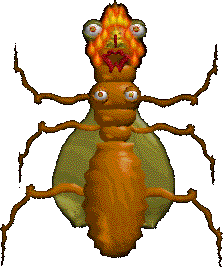Difference between revisions of "Gyou"
Where am i (talk | contribs) |
Where am i (talk | contribs) |
||
| Line 4: | Line 4: | ||
|width=223 | |width=223 | ||
|land=[[Shi-chieng]] | |land=[[Shi-chieng]] | ||
| − | |location=Plains of | + | |location=[[Plains of Chi-u]] |
|role=Lost Soul | |role=Lost Soul | ||
}} | }} | ||
| − | '''Gyou''' ({{TongNouAlphabet/Gi}} {{TongNouAlphabet/Yo}} {{TongNouAlphabet/U}}, '''ギョウ''') is one of the 8 creatures that [[Rin]] can reincarnate as in [[Eastern Mind: The Lost Souls of Tong-Nou]]. | + | '''Gyou''' ({{TongNouAlphabet/Gi}} {{TongNouAlphabet/Yo}} {{TongNouAlphabet/U}}, '''ギョウ''') is one of the 8 creatures that [[Rin]] can [[Reincarnation|reincarnate]] as in [[Eastern Mind: The Lost Souls of Tong-Nou]]. His mission is to participate in the Ritual of Time. |
| + | |||
| + | ==Mission== | ||
| + | Gyou was born in [[Shi-chieng]], with the task of participating in the Ritual of Time. However... | ||
| + | |||
| + | ==Walkthrough== | ||
| + | ...Gyou burns himself alive during the Ritual of Time, which involves him lighting a candle with flames that burst from his head. Gyou still accomplished his mission, though, since he lit the candle. | ||
==Character== | ==Character== | ||
| − | Unlike all other reincarnations and the protagonist, its name comes from a kanji that is not part of the [https://en.wikipedia.org/wiki/Kuji-kiri Kuji], 行 (line, verse) as seen in its | + | Unlike all other reincarnations and the protagonist, its name comes from a kanji that is not part of the [https://en.wikipedia.org/wiki/Kuji-kiri Kuji], 行 (line, verse) as seen in its [[Nameplate]]. One of its meanings, "to carry out" can call back to Gyou's role in the game. The kanji can also mean carya and samskara, which are buddhist terms; considering Eastern Mind was very influenced by buddhism, the meanings may be related. |
==Tong-Nou Book Entry== | ==Tong-Nou Book Entry== | ||
| Line 25: | Line 31: | ||
</gallery> | </gallery> | ||
| − | |||
{{EasternMindCharacters}} | {{EasternMindCharacters}} | ||
Latest revision as of 05:49, 2 May 2024
| Gyou | |
|---|---|
| Land | Shi-chieng |
| Location | Plains of Chi-u |
| Role | Lost Soul |
Gyou (![]()
![]()
![]() , ギョウ) is one of the 8 creatures that Rin can reincarnate as in Eastern Mind: The Lost Souls of Tong-Nou. His mission is to participate in the Ritual of Time.
, ギョウ) is one of the 8 creatures that Rin can reincarnate as in Eastern Mind: The Lost Souls of Tong-Nou. His mission is to participate in the Ritual of Time.
Mission
Gyou was born in Shi-chieng, with the task of participating in the Ritual of Time. However...
Walkthrough
...Gyou burns himself alive during the Ritual of Time, which involves him lighting a candle with flames that burst from his head. Gyou still accomplished his mission, though, since he lit the candle.
Character
Unlike all other reincarnations and the protagonist, its name comes from a kanji that is not part of the Kuji, 行 (line, verse) as seen in its Nameplate. One of its meanings, "to carry out" can call back to Gyou's role in the game. The kanji can also mean carya and samskara, which are buddhist terms; considering Eastern Mind was very influenced by buddhism, the meanings may be related.
Tong-Nou Book Entry
Born in Shi-chieng (Land of Time) to perform the Ritual of Time. His mission is to feed flames to the Candles of Time.
Likes
Being able to fly freely, Gyou enjoys hazardous aviation tricks like nose diving.
Dislikes
The fact that he must accomplish his assigned task is annoying. He would rather give it up and go on another freestyle flight.
Gallery
Gyou's appearance in the Karacters gallery.
Gyou's appearance in the Tong-Nou Illustrated Book.
| Eastern Mind Characters | |
|---|---|
| Reincarnations | Rin • Byou • Tou • Sha • Kai • Jin • Retsu • Zen • Gyou |
| Land of Life | Moku-gyou & Moku-gyou's partner • Zoh-gaeru Family • Tabelinai |
| Land of Desire | King-gyou • Chi-fang • Pu-ryao • Show-mi • Nai-nai • Take-yacco • Twei-twei • Long-ri & Long-yui • Rotating Boulder |
| Land of Time | Ka-gyou • Ying & Yang • Ga-show • T.B.C. |
| Land of Dreaming | Sui-gyou • Ah & Ung • Mong-i • Mong-aru • Zuo-mong • Pang-xie |
| Central Mountain | Tou-gyou • Twins from Tong-Nou (Bibo & Pipo • Babebu & Babebo • Jido & Jizo • Dadezu & Zazezu) |
| Phantom Marketplace | Mai-chiu |
| Every Land | A-mong Family (Ichi-a-mong • Ni-a-mong • San-a-mong • Yo-a-mong • Goh-a-mong) • Fang-shing |


